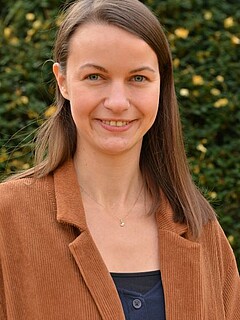PhD students 3rd cohort

Catherine Weis, M.A.
catherine.weis@uni-jena.de
Curriculum Vitae
2014-2017 B.A. studies of German language and literature and Philosophy at the University of Luxembourg
2017-2018 Studies in the "Trinational Master in Literature, Culture and Linguistic History of the German-Speaking World" (Metz, Saarbrücken, Luxembourg)
2018-2020 M.A. studies in "Literature - Art - Culture" (Core subject: German philology, secondary subject: Philosophy) at the Friedrich Schiller University Jena
08-09/2019 Internship at the Goethe and Schiller Archives of the Weimar Classics Foundation
2019-2021 Employee in Schiller's Garden House (FSU Jena)
since October 2021 Fellow in the Graduate Program "Modell Romantik"
PhD project
Modeling Poetry. Language and Subjectivity in Early Romantic Poems
What constitutes a Romantic poem? To answer this question, the PhD-project examines lyric production in the years 1798 to 1810, focusing primarily on the beginnings of the Romantic movement, in the context of which ideas about modern lyric poetry began to emerge.
The broad spectrum of lyric poetry around 1800 is characterized in particular by an experimental use of the repertoire of forms handed down from the European tradition as well as by a search for new compositional possibilities. The juxtaposition of metrically bound and free verse forms seems to characterize part of the experimental space of lyric poetry in this period.
The period around 1800 represents a threshold phase not only for the aesthetic and linguistic discourse, but also for questions concerning the philosophy of subject and identity. Early Romanticism reacted to the contingency experiences of modernity by reorienting relations of self and world. Subjectivity is not conceived as a firmly enclosed quantity, but as an open, fluid phenomenon in which the tension between overarching concepts of meaning and the general experience of loss of transcendence is expressed.
One central argument of my PhD-project is that in the interlocking search movements of poetic formal language and subjectivity as the interplay of formal and contentual representation, new poetological impulses are set for a modern poetry. Following recent model theories, the aim is to discuss these impulses on the basis of poem analyses. The aim is to establish a close link between textual studies at the micro level of individual poems and poetological and theoretical contexts.
In cross-author interpretations, the work focuses on lyrical texts by Friedrich von Hardenberg, Karoline von Günderrode, Ludwig Tieck, Clemens Brentano, and finally Joseph von Eichendorff, in whose early poems the modeling phase seems to come to a conclusion.